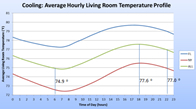|
|
|
Energy Audits for Rural Small Businesses
The U.S. Department of Agriculture's (USDA) offers grants and loans for renewable energy systems & energy efficiency improvements to qualifying rural small businesses and agriculture operations. USDA has funded FSEC to provide subsidized energy audits and produce the energy calculations required on the applications. YOUR business may qualify! Contact Janet McIlvaine at 321-638-1434.
More Information |
Habitat for Humanity So. Sarasota County, Inc. Receives Prestigious Housing Award
Congratulations! The Energy Department presented Housing Innovation Awards to 24 industry leaders from across the nation during the Energy and Environmental Building Alliance’s Excellence in Building Conference. These winners are “leading the movement to zero energy ready homes providing better places for Americans to live, stronger communities, and a more economically and environmentally resilient nation.” Habitat for Humanity So. Sarasota Co., Inc. was named a winner in the Affordable Housing category. The Laurel Gardens community of six Zero Energy Ready Homes in Nokomis is the first of its kind in Sarasota County.
DOE Tour on Zero |
|
Why 25 Years of an Evolving Energy Code Do Not Make More of a Difference
New and more stringent building energy codes are implemented with the assumption and expectation that significant energy conservation will occur. While simulation and various analysis methodologies may be reasonably sound at estimating the energy impact, the actual impact is largely dependent upon new code enforcement and occupant behavior. This work is based upon the research question: Do homes built to a newer energy code deliver measurable energy savings compared to homes built to a much earlier energy code? This residential research study was focused on comparing measured energy use of new code to old code homes. This paper presents the methodology of the research along with reasons why the measured savings are far less than predicted by simulations of homes built to the two codes. The results may be useful in policy decisions or evaluating the long-term implications of residential building energy codes.
Publication | Presentation |
Determining Appropriate Heating and Cooling Thermostat Set Points for Building Energy Simulations for Residential Buildings in North America
Existing building energy simulation tools have a purported tendency to over-predict heating use and, in some cases, to under-predict cooling use, an outcome often attributed to inappropriate assumptions about thermostat management. As a result, a systematic review was conducted for the purposes of determining typical heating and cooling set points for single-family houses in North America. The preliminary consensus results provide an empirical basis for establishing typical inputs for building energy simulation models, increasing prediction accuracy of heating and cooling loads. The results of this review have been applied as default values in the Lawrence Berkeley National Laboratory’s Home Energy Saver and Home Energy Scoring Tools, significantly improving on values previously in use.
Publication |
|
| 2016 Course Dates Coming Soon |
Residential Building Air Leakage (Blower Door) Testing
Learn how to perform residential building air leakage tests using a blower door in compliance with 2014 Florida Residential Energy Code. Offered December 21, 2015.
Register |
|






